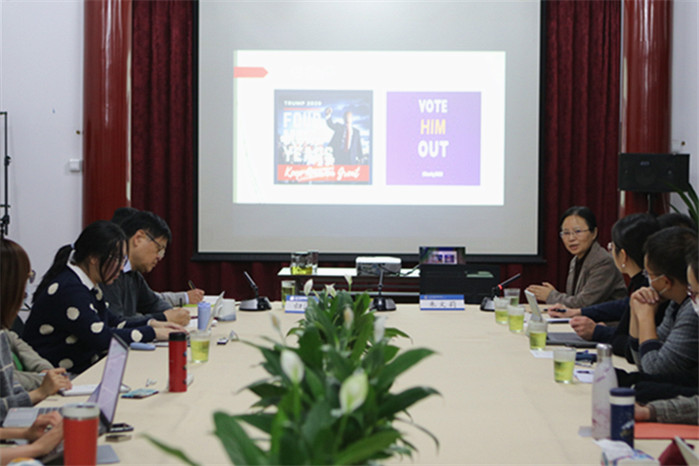On the evening of October 30th, 2020, the Institute of International & Strategic Studies (IISS), Peking University (PKU) held the 43rd seminar of "North Pavilion Dialogue" lecture series. Zhu Wenli, Professor at the School of International Studies (SIS) and Special Research Fellow of the IISS, PKU, gave a lecture entitled "The U.S. Choice and the Future of the World". The seminar was hosted by Gui Yongtao, Vice President of the IISS and Vice President of the SIS, PKU.

During the lecture, Prof. Zhu Wenli shared her four observations on the 2020 U.S. election, namely the election tracking, the changes in the U.S. over the past four years, the fate of populist nationalism, and the impact of the U.S. on the world. Compared to previous U.S. elections, this election is a critical decision on whether the incumbent president Donald Trump can gain the trust of the American people and whether the U.S. is turning blue. This is not an either-or question between the two candidates, but a situation where the decision is made on whether to trust Trump or not, which is actually detrimental to Trump's re-election. Trump intends to replicate his electoral vote miracle four years ago, but the window of opportunity is rapidly closing. Based on the above factors, this year's U.S. election may be a tight race.
Zhu pointed out several changes in this year's U.S. election, including the active participation of young voters represented by "Millennials" and "Generation Z" and the establishment Republicans abandoning Trump and getting rid of his kidnapping of the party. Besides, the "October surprise", including real and fake news such as the media's expose of Trump's tax returns, the first presidential debate chaos, Trump's infection with COVID-19 and hospitalization, and failed negotiations on additional pandemic relief, has a negative impact on Trump.
Zhu further explained that the "Trump fever" is not caused by the changes brought by Trump himself, but is a complex symptom produced by four major distortions in the U.S.: the closed loop of anti-intellectualism, the information cocoon, the evolution of the American exception into American xenophobia, and the growing inequality caused by a K-shaped economic recovery. It is extremely difficult for the U.S. to quickly relieve the symptom. Based on this, and considering the direction of the relationship between the U.S. and the world, she argued that in general, it is difficult for the world to recover until the U.S. heals. As an external victim of U.S. populist nationalism, China needs to brainstorm how to deal with the issue. The best outcome is obviously not a "new cold war", but a bright future in which countries compete rationally and the world politics moves forward.
During the Q&A session, Prof. Zhu had exchanges and discussions with the teachers and students present at the seminar on issues such as the political turn in the U.S., the reorganization of political parties and political improvement in the U.S., the influence of new media, and the crisis and the opportunity for a "cultural breakthrough" in the U.S. (Contributed by Zeng Chuyuan)
Editor: Li Fangqi, Zeng Chuyuan Photographer: Zheng Peijie

